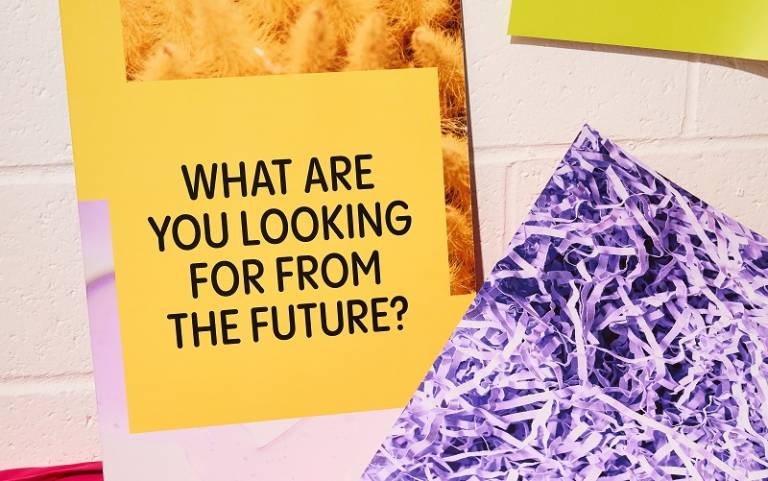The home of the future, designed with independent living, healthy ageing, sustainability and technology at its heart, is the focus of new interactive and immersive exhibition, inspired by researchers at the UCL Institute of Healthcare Engineering.

The free exhibition, 'Tomorrow's Home', will be at the Museum of the Home in Hoxton and was created by public engagement consultancy The Liminal Space. It imagines how our dwellings could be designed to help us live independently and healthily as we age, whilst also supporting our changing planet. The exhibition features an interactive installation of a home thirty years in the future, influenced by themes including climate change, an ageing population and digital automation.
It uses recent research from the UCL Institute of Healthcare Engineering (IHE) as the inspiration for fictional home innovations in the future and explores how they may affect us, our communities and our planet in the year 2050. Research themes include our sense of ageing, the meaning of home and the role of technology in mediating our sense of and our experience of health and well-being.
Some of the specific research from UCL IHE that inspired the exhibition includes Professor Ivana Drobnjak (UCL Computer Science)'s work on a range of sensors to capture information around the home and share it with medical professionals for analysis. Other work includes Professor Manish Tiwari (UCL Mechanical Engineering)'s project on embedded haptic sensors for preventing diabetic foot ulcers, which inspired the interactive doormat. Professor Yvonne Rogers (UCL Computer Science) worked with Professor Drobnjak and focuses her own research on designing innovative technologies to enhance how families communicate, learn and play.
Visitors will experience the lives of three people who share a home in Hackney in 2050, where the lines between a dystopia and utopia are blurred. Imagined healthcare technologies are embedded in everyday household objects and routines, from artificial intelligence that recreates memories for dementia patients, to a toilet that can monitor health and wellbeing, doormats that recognise the homeowner's walking styles to detect intruders and toothbrushes implanted with tiny sensors that analyse saliva for any changes in bacteria levels.
Professor Rebecca Shipley (Director, UCL Institute of Healthcare Engineering) said: "The inspiration for this exhibition stems from real research going on at UCL. Academics here are at the forefront of advances in artificial intelligence, 3D-printing, nano-sensing and other innovations that will shape the future of our lives.
"Tomorrow's Home brings this research to life in a dynamic way that showcases the latest innovations in this area while inspiring wider conversations about how our homes might better support and improve our health and wellbeing in the future."
The exhibition will encourage the public to join a wider conversation on how these technological changes might affect us, taking in issues such as privacy, data collection and management and the impact of fully automated homes on local community connections.
Other features include wallpaper that analyses the household's mood using microbes, perfectly optimised 'smart' food to snack on and smart sensors installed throughout the home.
Members of the public will also have the opportunity to meet academics from the UCL IHE through online talks and in-person workshops accompanying the exhibition, including Christmas carolling workshops with robots and a webinar about the future of smart devices.
Sarah Douglas, Director of The Liminal Space, explained the design thinking behind the exhibition: "The home of the future has the potential to help us flourish in ever more tailored and sophisticated ways, but alongside these benefits come important ethical questions. What belongs inside our homes and what do we want to leave at the door? We have used imaginative design and speculative storytelling to bring to life the possibilities and the complexities of these technologies, and encourage audiences to think deeply about what matters to them in the home of the future."
Marilyn Aviles, Tomorrow's Home Project Lead (UCL Institute of Healthcare Engineering) said: "As well as showcasing UCL research in innovations for healthy ageing, we hope the exhibition and our series of talks will bring people together from different perspectives and experiences. We want to create spaces for people to listen and explore how we can influence what the future can sustainably bring for our wellbeing - as individuals and as a society. We hope that this will inspire communities to learn from each other and to work for a healthier future together."
Vanessa Meade (Curator, Museum of the Home) commented: "Technology is transforming homes all over the world and it is no surprise it will continue to have an impact on our homes in the future. The Museum of the Home is delighted to welcome an imagining of this through Tomorrow's Home.
"This exhibition focuses not on technology that can tell us when to order more milk, but on how health technologies in the home could have a real and lasting impact on the way we live in the future - whilst also considering the cost to our privacy. All based on leading academic research, it is a fascinating insight into how our homes could look in the future."
Tomorrow's Home is created by The Liminal Space in collaboration with researchers from the UCL Institute of Healthcare Engineering. The project is a recipient of the Royal Academy of Engineering's Ingenious Award. The exhibition opens on Saturday November 20 2021 and runs until Sunday 9 January 2022.






